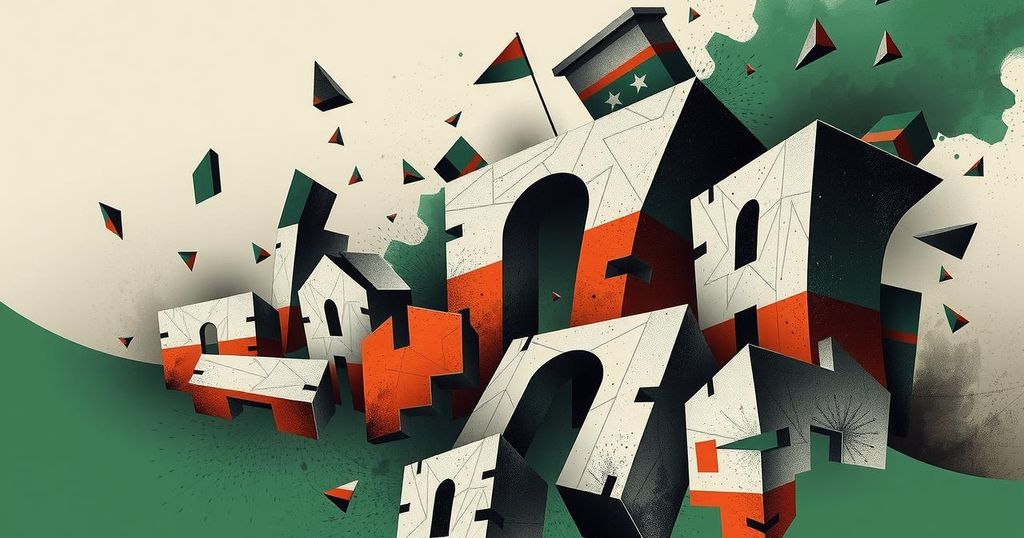Libya faces political turmoil as Prime Minister Dbeibah attempts to consolidate power over militias, leading to violence in Tripoli. Protests for elections and a new constitution have followed. Experts believe recent unrest may present an opportunity for renewed political progress, according to UN reports.
Libya still stands at a critical juncture, with its capital, Tripoli, experiencing relative calm this week amid ongoing turmoil. Earlier in May, clashes erupted between armed factions and pro-government forces after Prime Minister Abdul Hamid Dbeibah ordered the dismantling of armed militias. Tragically, this violence resulted in civilian casualties, including the death of eight people in Tripoli. Additionally, the bodies of 58 individuals were uncovered in a hospital controlled by the Stabilization Support Apparatus militia, which had been in conflict with government forces.
Hanan Salah, a researcher at Human Rights Watch, highlighted the instability, saying, “The latest fighting in Tripoli that resulted in civilian casualties is a strong indication of the fragility of the situation.” She went on to express concerns over the reckless nature of the warfare, noting how armed groups seem to disregard civilian welfare completely.
Since the civil war began in 2014, Libya has been divided into two governments–the UN-backed Government of National Unity based in Tripoli, led by Dbeibah, and the opposition House of Representatives in the east, run by Prime Minister Ossama Hammad, backed by former warlord Khalifa Haftar. While Dbeibah’s government appears to be facing challenges capturing control of armed militias, the eastern half remains firmly under Haftar’s heavy rule.
The recent fighting in Tripoli subsided, resulting in an undisclosed agreement between the armed factions and the Dbeibah administration. However, this has prompted protests, with citizens demanding national elections and a revival of the constitutional drafting, which was put on hold after the UN peace process stalled in December 2021. Thousands of demonstrators have also called for Dbeibah to step down; in response, he delivered a speech asserting, “Our goal is a Libya free of militias and corruption.”
Experts like Tim Eaton from Chatham House emphasize that the longstanding conflict has often been static, as various groups vie for power and resources. Eaton pointed to a current dispute over control of a critical state institution as a pivotal factor in escalating tensions between rival factions. He warned of the significant risk of returning to civil war, yet he also mentioned the potential for diplomatic progress amid crises, citing past instances of political change following major conflicts in Tripoli.
Eaton indicated that current tensions could serve as a turning point for political rejuvenation in Libya. He reflected on previous spikes in violence, suggesting they ultimately led to political resolutions and a renewed focus on governance. Mohammed al-Dairi, a former foreign minister, echoed this sentiment, identifying a unified government as a necessary first step in resolving Libya’s institutional divide.
The United Nations Support Mission in Libya has stepped up with a new report, presenting various routes forward to ensure elections are held, either through simultaneous presidential and legislative elections or in sequenced steps involving a new constitution first. Salah reiterated the need for cooperation among Libyan factions, stating, “The human rights crisis and political divisions in Libya will not be solved overnight. Conducting free and fair elections is elusive today but at the end of the day, what option do the competing Libyan parties really have?”
Libya finds itself at a crucial crossroads as ongoing violence and political instability continue to threaten its fragile state. With Prime Minister Abdul Hamid Dbeibah striving for control and the populace calling for elections, the involvement of the UN offers a glimmer of hope. The way forward might hinge on forming a unified government and conducting elections, bringing the possibility of progress towards stability and democracy in the war-torn nation.
Original Source: www.dw.com






